പാലിയേറ്റീവ് രംഗത്തെ പ്രതിഭകളിലൂടെ -ഡോ.ബാല്ഫോര് മൗണ്ട്.
തയ്യാറാക്കിയത് -ജോബി ബേബി ,
''The suffering of people at the end of life has been enough to legalize euthanasia and physician- assisted suicide but interestingly, not enough to mandate excellence in palliative care for all Canadians. This is an ongoing need and in my view, a tragedy.'-Balfour Mount
ഒറ്റവാക്കില് ബാല്ഫോര് മൗണ്ട് ആരാണെന്ന് ചോദിച്ചാല് 'The father of palliative care in Canada, physician Balfour Mount on the legacy of Cicely Saunders, the start of palliative care, and the true meaning of medical aid in dying'എന്നാകും മറുപടി. ജനനം 1939 ഏപ്രില് 14 കാനഡയിലെ ഒട്ടാവ. കാനഡയില് പ്രാഥമിക വിദ്യാഭ്യാസം പൂര്ത്തിയാക്കിയ അദ്ദേഹം 1963ല് ക്വീന്സ് സര്വകലാശാലയില് നിന്ന് മെഡിക്കല് ബിരുദം കരസ്ഥമാക്കിയ അദ്ദേഹം തുടര്ന്ന് മാക്ഗില് സര്വകലാശാലയില് നിന്നും ശസ്ത്രക്രിയയും യൂറോളജിയും പഠിച്ചു.1973 ജനുവരിയില് യൂറോളജിക്ക് കാന്സര് സര്ജനായ മൗണ്ട് എലിസബത്ത് കുബ്ലര് റോസ് മോണ്ട്രിയായിലെ റോയല് വിക്ടോറിയ ഹോസ്പിറ്റലിലെ അവസ്ഥകളെ പറ്റി എഴുതിയ ''On Death and Dying' എന്ന ബുക്ക് മൗണ്ടിനെ വല്ലതെ സ്വാധീനിച്ചു. 1973 സെപ്റ്റംബറില് സിസിലി സോണ്ണ്ടേഴ്സിന്റെ സെന്റ് ക്രിസ്റ്റഫര് ഹോസ്പിറ്റല് സന്ദര്ശിക്കാന് ഇടയായ മൗണ്ട് അതേപോലെ തന്നെയുള്ള ഒരു പാലിയേറ്റീവ് കെയര് വിക്ടോറിയ ഹോസ്പിറ്റലിലും സ്ഥാപിക്കാന് തീരുമാനിച്ചു. അതിനെ തുടര്ന്ന് അദ്ദേഹം അത് സ്ഥാപിക്കുകയും അതിന്റെ ആദ്യത്തെ ഡയറക്ടര് ആയും സേവനമനുഷ്ഠിച്ചു.1990 ല് പാലിയേറ്റീവ് കെയര് മാക്ഗില് സ്ഥാപിക്കുകയും 1999ല് ഇന്റഗ്രേറ്റഡ് ഹോള് പേഴ്സണ് കെയര് മാക്ഗിലില് യൊജിപ്പിക്കുകും ചെയ്തു. മാക്ഗില് സര്വകലാശാലയിലെ പ്രൊഫെസ്സറുമായി ജോലിനോക്കി അദ്ദേഹം.
മൗണ്ട് സിസിലി സോണ്ണ്ടേഴ്സിന്റെ സെന്റ് ക്രിസ്റ്റഫര് ഹോസ്പിറ്റല് സന്ദര്ശിക്കാന് ഇടയായ സംഭവത്തെപ്പറ്റിയും അവരുമായി ഉണ്ടായിരുന്ന ബന്ധത്തെപ്പറ്റിയും എപ്പോഴും വാചാലനായിരുന്നു.
''I remember the millisecond! I heard of St. Christopher's Hospice in London through the Elizabeth Kubler-Ross book, 'On Death and Dying', published in 1970. We had done our study at the Royal Victoria Hospital and I knew we had a problem. In my report to the Board at the Vic, I wanted to make some suggestions on how care could be improved, so I phoned Dr. Saunders at St. Christopher's Hospice. After telling her who I was, I said, 'Could I come for a visit?' And she said, 'I could not possibly consider that now, I am on my way to lunch. Call me in an hour!' Click! So I called back and she said, 'I know you. You want to come to London with your wife, see a few plays, have a quick look around the hospice and go home. Well, I won't have it! I'll tell you what, leave your wife at home, be prepared to stay for a week, role your sleeves up and work hard, and I'll have you.' That's when I fell in love with Cicely. I visited in the second week of September 1973. I was deeply impressed by St. Christopher's, by Cicely, Mary Banes, Terese Vanier, Tom West and the galaxy of superstars she had assembled, including the wonderful nursing staff'.
''Cicely was a very strong leader, a clear thinker, discerning, and had a good sense of humour. She was insightful, and she knew what she wanted and she got it, but not without a lot of hard work. Her other remarkable advantage was that she started out as a nurse and then became a social worker and then, so that she could fulfill her dream, she went to medical school and became a physician. So she was a one-person team! This gave her a broad experience with the whole person needs of both patient and family. We became very close friends'.
''Her most significant contribution was the concept of 'total pain', based on her observation that suffering may be related to the pathophysiology of the disease; it is always modified by the psychosocial, existential and spiritual aspects of suffering. This was a major breakthrough. In terms of the control of pain, one needed to consider each of those domains, and if you did, you could almost always get total pain control. Also important was her observation that the patient and family need to be considered together as the unit of care. These are Cicely's enduring contributions; so much flows from them.
This thinking was and still is revolutionary in the healthcare system a half century after Cicely wrote about it because it is still the case that Western healthcare is aimed at four things: investigating, diagnosing, prolonging life and curing. The kind of care defined by her fundamental goals is not even thought of in our healthcare system. Too frequently it ins't considered in Quebec because of shrinking budgets that demand that family doctors have only a few minutes to see a new patient. It's crazy'.
മരിക്കുന്നതിനുള്ള വൈദ്യസഹായം (medical aid in dying) എന്നതിനെ സംബന്ധിച്ച് മൗണ്ടിന് വ്യകത്മായ കാഴ്ചപ്പാട് ഉള്ള വ്യക്തിയാണ് . അതിനായി അദ്ദേഹം ഒരു ഉദാഹരണം നമ്മുക്ക് കാട്ടി തരുന്നു.''പാലിയേറ്റീവ് കെയര് വാര്ഡില് ഞാന് അഡ്മിറ്റ് ചെയ്തിരുന്ന ഒരു ചാര്ട്ടേര്ഡ് അക്കൗണ്ടന്റ് അദ്ദേഹത്തിന്റെ ഭാര്യയോടൊപ്പം എന്നെ കാണാന് വന്നു. അദ്ദേഹത്തിന് കാന്സര് ആയിരുന്നു . സാമാന്യം നല്ല കുടുംബ ജീവിതം നയിച്ചിരുന്ന അവര്ക്ക് രണ്ട് ആണ്കുട്ടികളാണ് ഉണ്ടായിരുന്നത്. കടന്ന് വന്നയുടനെ ഭാര്യ എന്നോട് പറഞ്ഞു ഞാന് എന്റെ ഭര്ത്താവിന് വേണ്ടി സംസാരിക്കാം ഞങ്ങള് ഒരു പാട് സഹിച്ചു . എങ്ങനെയെങ്കിലും ഞങ്ങള്ക്കിത് അവസാനിപ്പിക്കണം , അദ്ദേഹത്തിന് മരിക്കണം. ഞാന് വളരെ ശാന്തനായി ഇരുന്ന് അവരെ കേട്ടശേഷം പറഞ്ഞു കുറച്ചു ദിവസം കഴിയുന്നവരേക്കും ക്ഷമിക്കൂ, വീണ്ടും നമ്മുക്ക് ഒന്നു കൂടെ ഇരുന്ന് ആലോചിക്കാം. അന്ന് ഉച്ചയോടെ അദ്ദേഹത്തിന്റെ ഭാര്യ വെളിയില് പോയ അവസരത്തില് ഞാന് അദ്ദേഹത്തോട് സംസാരിക്കാന് വാര്ഡില് പോയി. അദ്ദേഹത്തിന്റെ സമീപത്തിരുന്നു.ഞാന് അദ്ദേഹത്തോട് ഇപ്രകാരം മന്ത്രിച്ചു ''ഞാന് ഇങ്ങനെ ഒരാളെ, മരിക്കണം എന്ന ആശയോടെ ജീവിക്കുന്ന ഒരാളെ കണ്ടിട്ടില്ല എന്ന് പറഞ്ഞു . 50വയസ്സോളം പ്രായമുള്ള ആ മനുഷ്യന് പോട്ടികരഞ്ഞു കൊണ്ട് എന്നോട് സര് താങ്കള് പറഞ്ഞത് സത്യമാണ് .എനിക്ക് ജീവിക്കണ്ട, എന്റെ ഭാര്യയ്ക്ക് ഒരു ഭാരമായി ജീവിക്കാന് എനിക്ക് സാധിക്കില്ല. ഉടനെ ഞാന് അദ്ദേഹത്തോട് പറഞ്ഞത് ''ഇത്തരത്തില് കാന്സര് ബാധിച്ചു വീട്ടില് താമസിക്കാന് മാത്രമേ ബുദ്ധിമുട്ടുള്ളൂ, അതിനാണ് ഇവിടെ നിങ്ങളെപ്പോലെ അനേകരെ സഹായിക്കാന് പാലിയേറ്റീവ് കെയര് ഉള്ളത്''. ഇവിടെ നിങ്ങളെ ഭാര്യയ്ക്കും മക്കള്ക്കും വന്ന് കാണാന് സാധിക്കും .''നിങ്ങള് ഞങ്ങള്ക്ക് ഒരു ഭാരമേ അല്ല, ഞങള് ഇവിടെ അയിരിക്കുന്നത് നിങ്ങളെ സഹയിക്കാനാണ്''. ഞങള് കൊടുത്ത ആ ആത്മവിശ്വാസം അദ്ദേഹത്തില് ഫലം കണ്ടുവെന്ന് വേണം കരുതാന്. ഒന്ന് രണ്ട് ദിവസത്തിനുള്ളില് അദ്ദേത്തിന്റെ ആരോഗ്യനിലയില് കാതലായ മാറ്റമുണ്ടാവുകയും , മരിക്കണം എന്ന ചിന്തകളോ , അതിനെപ്പറ്റി പിന്നീട് ഒരിക്കലും പറയുകയോ ചെയ്യ്തില്ല. ആ ഒരൊറ്റ സംസാരം അദ്ദേഹത്തിന്റെ ജീവിതം മെച്ചപ്പെടുത്താന് സഹായിച്ചു. ഞാന് മറ്റുള്ളവര്ക്ക് ഒരു ഭാരമാണെന്ന ചിന്ത അദ്ദേഹത്തില് നിന്നും തൂത്തെറിയാന് സാധിച്ചു. ഏതൊരു തവണയും മരിക്കുന്നതിനുള്ള വൈദ്യസഹായം എന്ന് കേള്ക്കുമ്പോള് എന്റെ മനസ്സിലേക്ക് ഈ സംഭവം കടന്ന് വരും.
ബഹുമതികള് :-
In 1985, he was made a Member of the Order of Canada in recognition for having 'founded the first Palliative Care Service at Montreal's Royal Victoria Hospital'.
In 2003, he was promoted to Officer in recognition of being 'the father of palliative care in North America'.
In 1988, he was made an Officer of the National Order of Quebec.
He has been awarded honorary degrees from the University of Calgary,Queen's University,and Dalhousie University.
പുസ്തകം :-
Ten Thousand Crossroads: The Path as I Remember It.
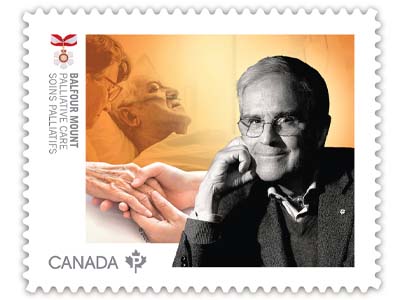


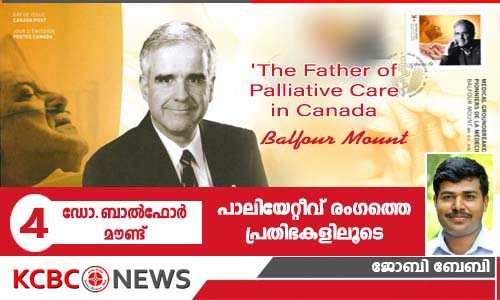


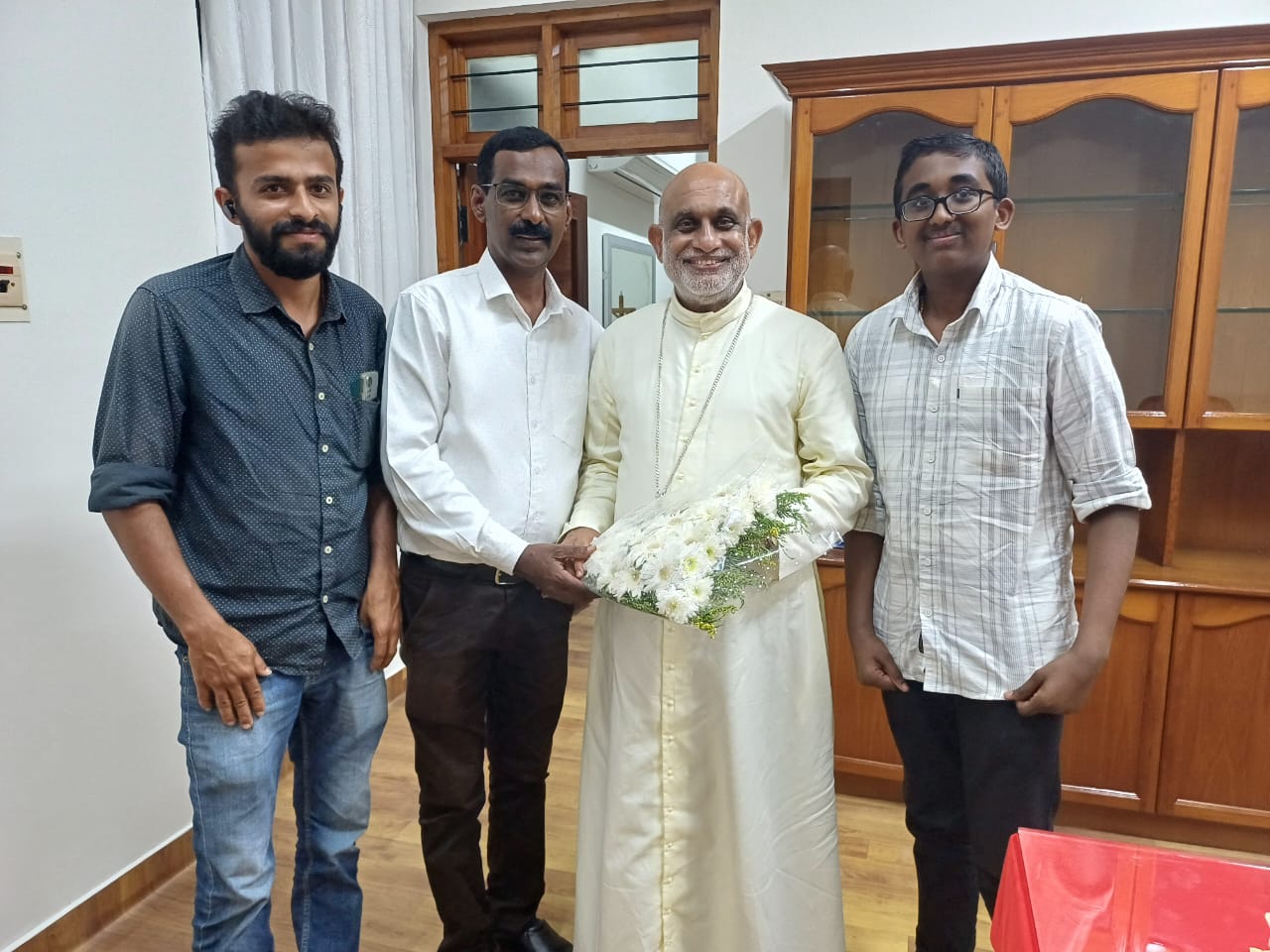


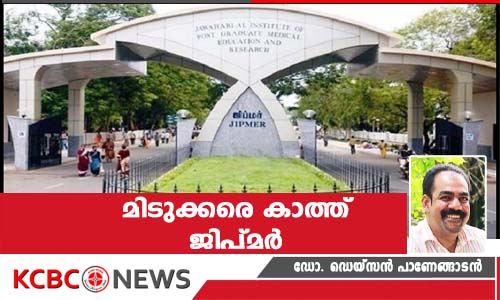
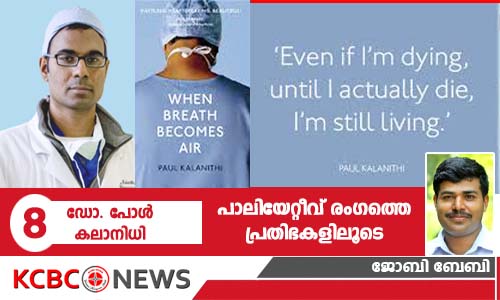
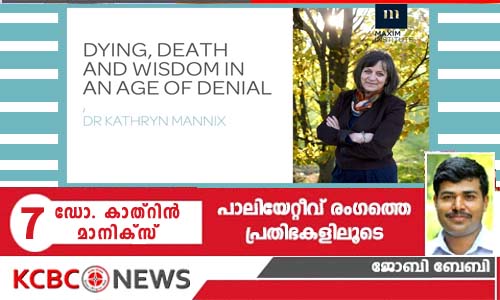
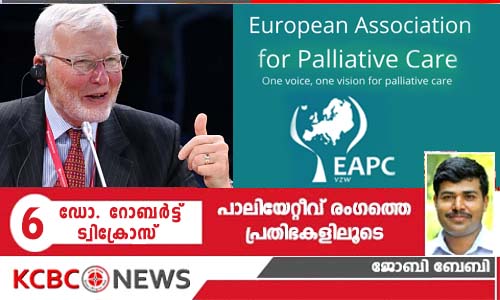

Comments